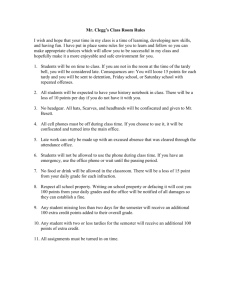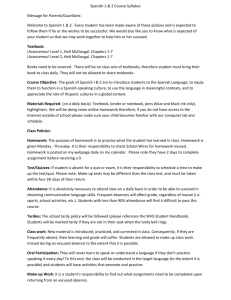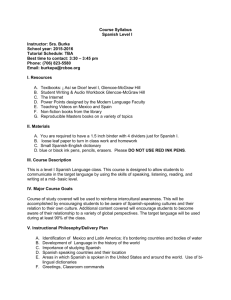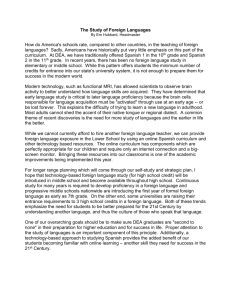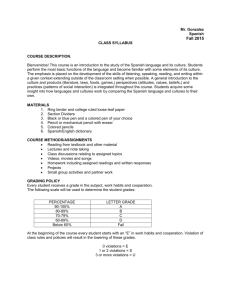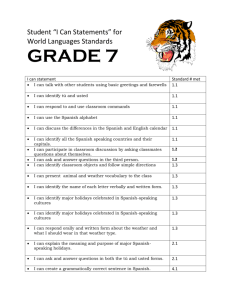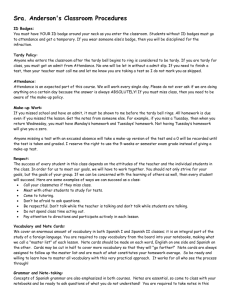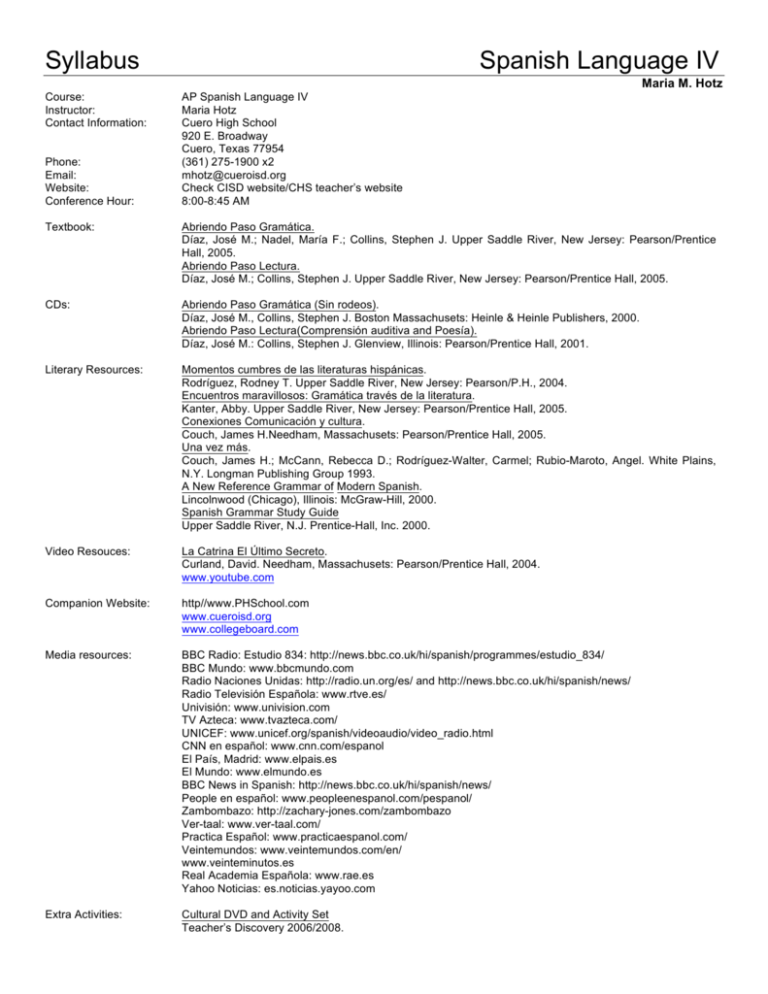
Syllabus
Spanish Language IV
Maria M. Hotz
Course:
Instructor:
Contact Information:
Phone:
Email:
Website:
Conference Hour:
AP Spanish Language IV
Maria Hotz
Cuero High School
920 E. Broadway
Cuero, Texas 77954
(361) 275-1900 x2
mhotz@cueroisd.org
Check CISD website/CHS teacher’s website
8:00-8:45 AM
Textbook:
Abriendo Paso Gramática.
Díaz, José M.; Nadel, María F.; Collins, Stephen J. Upper Saddle River, New Jersey: Pearson/Prentice
Hall, 2005.
Abriendo Paso Lectura.
Díaz, José M.; Collins, Stephen J. Upper Saddle River, New Jersey: Pearson/Prentice Hall, 2005.
CDs:
Abriendo Paso Gramática (Sin rodeos).
Díaz, José M., Collins, Stephen J. Boston Massachusets: Heinle & Heinle Publishers, 2000.
Abriendo Paso Lectura(Comprensión auditiva and Poesía).
Díaz, José M.: Collins, Stephen J. Glenview, Illinois: Pearson/Prentice Hall, 2001.
Literary Resources:
Momentos cumbres de las literaturas hispánicas.
Rodríguez, Rodney T. Upper Saddle River, New Jersey: Pearson/P.H., 2004.
Encuentros maravillosos: Gramática través de la literatura.
Kanter, Abby. Upper Saddle River, New Jersey: Pearson/Prentice Hall, 2005.
Conexiones Comunicación y cultura.
Couch, James H.Needham, Massachusets: Pearson/Prentice Hall, 2005.
Una vez más.
Couch, James H.; McCann, Rebecca D.; Rodríguez-Walter, Carmel; Rubio-Maroto, Angel. White Plains,
N.Y. Longman Publishing Group 1993.
A New Reference Grammar of Modern Spanish.
Lincolnwood (Chicago), Illinois: McGraw-Hill, 2000.
Spanish Grammar Study Guide
Upper Saddle River, N.J. Prentice-Hall, Inc. 2000.
Video Resouces:
La Catrina El Último Secreto.
Curland, David. Needham, Massachusets: Pearson/Prentice Hall, 2004.
www.youtube.com
Companion Website:
http//www.PHSchool.com
www.cueroisd.org
www.collegeboard.com
Media resources:
BBC Radio: Estudio 834: http://news.bbc.co.uk/hi/spanish/programmes/estudio_834/
BBC Mundo: www.bbcmundo.com
Radio Naciones Unidas: http://radio.un.org/es/ and http://news.bbc.co.uk/hi/spanish/news/
Radio Televisión Española: www.rtve.es/
Univisión: www.univision.com
TV Azteca: www.tvazteca.com/
UNICEF: www.unicef.org/spanish/videoaudio/video_radio.html
CNN en español: www.cnn.com/espanol
El País, Madrid: www.elpais.es
El Mundo: www.elmundo.es
BBC News in Spanish: http://news.bbc.co.uk/hi/spanish/news/
People en español: www.peopleenespanol.com/pespanol/
Zambombazo: http://zachary-jones.com/zambombazo
Ver-taal: www.ver-taal.com/
Practica Español: www.practicaespanol.com/
Veintemundos: www.veintemundos.com/en/
www.veinteminutos.es
Real Academia Española: www.rae.es
Yahoo Noticias: es.noticias.yayoo.com
Extra Activities:
Cultural DVD and Activity Set
Teacher’s Discovery 2006/2008.
COURSE OVERVIEW
Acquiring another language incorporates communication skills such as listening, speaking, reading, writing, viewing, and
showing. Students develop these communication skills by using knowledge of the language, including grammar, and
culture, communication and learning strategies, technology, and content from other subject areas to socialize, to acquire
and provide information, to express feelings and opinions, and to get others to adopt a course of action. While knowledge
of other cultures, connections to other disciplines, comparisons between languages and cultures, and community
interaction all contribute to and enhance the communicative language learning experience, communication skills are the
primary focus of language acquisition.
Students of languages other than English gain the knowledge to understand cultural practices (what people do) and
products (what people create) and to increase their understanding of other cultures as well as to interact with members of
those cultures. Through the learning of languages other than English, students obtain the tools and develop the context
needed to connect with other subject areas and to use the language to acquire information and reinforce other areas of
study. Students of languages other than English develop an understanding of the nature of language, including grammar,
and culture and use this knowledge to compare languages and cultures and to expand insight into their own language and
culture. Students enhance their personal and public lives and meet the career demands of the 21st century by using
languages other than English to participate in communities in Texas, in other states, and around the world.
Why Study Spanish?
• Over 390 million people around the world speak Spanish.
• Spanish is the second most spoken language in the world.
• It is the second most common language in the U.S.
o 16.3% of the population in the U.S. is Hispanic.
o 37.6% of the population in Texas is Hispanic.
Objectives (TEKS: The provisions of this §114.21 adopted to be effective September 1, 1998, 22 TexReg 4930.)
• COMMUNICATIONS: The student communicates in a language other than English using the skills of listening, speaking,
reading, and writing. The student is expected to:
o Engage in oral and written exchanges to socialize, to provide and obtain information, to express preferences and
feelings, and to satisfy basic needs.
o Interpret and demonstrate understanding of simple, straightforward, spoken and written language such as instructions,
directions, announcements, reports, conversations, brief descriptions, and narrations.
o Present information and convey short messages on everyday topics to listeners and readers.
•
CULTURES: The student gains knowledge and understanding of other cultures. The student is expected to:
o Use the language at the intermediate proficiency level to demonstrate an understanding of the practices (what people
do) and how they are related to the perspectives (how people perceive things) of the cultures studied.
o Use the language at the intermediate proficiency level to demonstrate an understanding of the products (what people
create) and how they are related to the perspectives (how people perceive things) of the cultures studied.
•
CONNECTIONS: The student uses the language to make connections with other subject areas and to acquire information.
The student is expected to:
o Use resources (that may include technology) in the language and cultures being studied at the intermediate proficiency
level to gain access to information.
o Use the language at the intermediate proficiency level to obtain, reinforce, or expand knowledge of other subject areas.
•
COMPARISONS: The student develops insight into the nature of language and culture by comparing the student's own
language and culture to another. The student is expected to:
o Use the language at the intermediate proficiency level to demonstrate an understanding of the nature of language
through comparisons of the student's own language and the language studied.
o Use the language at the intermediate proficiency level to demonstrate an understanding of the concept of culture
through comparisons of the student's own culture and the cultures studied.
o Use the language at the intermediate proficiency level to demonstrate an understanding of the influence of one
language and culture on another.
•
COMMUNITIES: The student participates in communities at home and around the world by using languages other than
English. The student is expected to:
o Use the language at the intermediate proficiency level both within and beyond the school setting through activities such
as participating in cultural events and using technology to communicate.
o Show evidence of becoming a lifelong learner by using the language at the intermediate proficiency level for personal
enrichment and career development.
CLASSROOM GUIDELINES AND RULES
I expect that we will work together to create an enjoyable classroom environment in which you and I can grow and learn.
All school rules should be observed (consult your Student Handbook for more information).
• Follow appropriate STUDENT DRESS CODE.
• Follow the discipline policy posted in STUDENT CODE OF CONDUCT.
• All PERSONAL ELECTRONIC DEVICES should be TURNED OFF DURING CLASS.
• No food and/or drinks are allowed in class (including gum and candy).
• Restroom breaks will be restricted-2 per semester (unless indicated differently by the nurse’s office).
Subsequent restroom breaks will be counted as tardies (*see TARDY POLICY). A PERMISSION SLIP-PASS
will be assigned to each student to keep track of these and other permits he/she would require.
BE RESPONSIBLE for your behavior and your work and therefore are accountable for it…reduce the risk of
getting in trouble.
• You are in control of making acceptable choices. You are competent to make these choices wisely.
• You are responsible for what happens as a result of your choices.
• Cheating is inexcusable and will not be tolerated. It will be reported as an offense and will be handled according
to the discipline plan.
• The iPad is considered a classroom tool. The teacher will indicate the appropriate activities and time to
use it. Failure to comply with the teacher’s instructions will result in a referral.
BE RESPECTFUL with your teachers and with other students…reuse your good manners.
• Arrive ON TIME to class (*see TARDY POLICY)
• Listen when somebody else is speaking (don’t get distracted or distract others during instruction).
• Listen carefully when an instruction is given.
• Be polite. Only good comments about yourself and others are allowed.
• Class will be dismissed by the instructor when bell rings.
BE RESOURCEFUL…recycle what your already know and use it!
• Take an active role in your learning.
• Use ALL resources available (I don’t know is not a High-School student answer).
• Feel free to ASK the instructor when you don’t understand something.
• Come prepared with materials every day and make sure you are ready BEFORE class starts.
• We all make mistakes…learn from them.
Consequences for not following these guidelines are counseling, parent conferences, teacher detention, referral for
continued violation, lunch detention, administrative detention, principal’s detention, ISS or OSS.
TARDY POLICY
• You should be IN the classroom BEFORE the bell rings. Instructor will take attendance as soon as the bell rings.
• TARDIES ARE COUNTED PER SEMESTER
ST
1 SEMESTER = Aug. 27-Dec. 20
nd
2 SEMESTER = Jan. 7-May 30
• Any student should have no more than 6 tardies during each semester (according to Student Handbook), and
should be reported to the school office with the following consequences:
ST
1 TARDY - VERBAL WARNING/STUDENT CONFERENCE
ND
2 TARDY - PARENT-TEACHER CONFERENCE
RD
3 TARDY - PARENT-AP CONFERENCE
TH
4 TARDY - ADMINISTRATIVE DETENTION
TH
5 TARDY - ADMINISTRATIVE DETENTION
TH
6 TARDY - PRINCIPAL’S DETENTION
GRADING PROCEDURES
50% TESTS/PROJECTS (chapter and vocabulary tests, and projects)
• Chapter tests include all vocabulary, grammar and cultural aspects reviewed.
• Vocabulary exams include its use and understanding.
• A construction/cultural project will be assigned every cycle. For some projects you will need to use the internet.
The school library provides this service (open during lunch, and 30 min. before and after school).
30% COMPREHENSION CHECKS (vocabulary and grammar quizzes, speaking and writing assignments that
involve creative/research process and conclusions)
• Vocabulary definitions quiz every week.
• Grammar quizzes according to the lesson.
• Writing/presenting paragraphs and short essays according to the lesson.
• Writing/presenting dialogues according to the lesson.
• Translation work every chapter.
20% DAILY WORK (classwork, homework, reviews)
• Workbook practice according to the lesson.
• Listening practice according to the lesson.
• Video workbook every week.
• Homework every week.
• Review every chapter.
*The semester exam counts 20% of the semester average (6 six-week cycles, 2 semester exams)
•
•
Late work (starting on first day late) will be graded on a 70-0 scale.
There is NO EXTRA CREDIT work.
•
•
•
If you are absent, make up work must be submitted the day after you received it (1:1).
If you are present the day a test is given you are expected to take the test. If you are absent the day a test is
given you will take the test the day you return back to class.
In case of unexcused absence, the work will be graded on a 70-0 scale.
•
•
•
•
Retesting for chapter and vocabulary tests:
Schedule 1 day for tutorial with teacher.
The second test to be completed within 1 week of the first test.
The highest grade will be 70.
•
•
•
•
Student may redo an assignment:
Must work under supervision of teacher.
The second assignment must be completed within 1 day.
The highest grade will be 70.
COMMUNICATION WITH PARENTS AND GUARDIANS
Communication is very important during the learning process. Parent-Teacher conferences can be requested either by the
parent or the instructor. Parents/Guardians should feel free to contact me at school and schedule a conference, send a
note, or e-mail me with any questions or concerns:
• If there is a discipline problem.
• If there is an attendance or tardy problem.
• If there is an academic problem.
An important goal in the Spanish Language course is to understand the culture of the countries in which the language is
spoken. The program includes several projects and activities related to these cultural aspects, such as Day of the Dead,
Christmas Traditions, and Hispanic Heritage. Please, let the teacher know on a timely manner if the student cannot
complete the project. *An academic project will be assigned instead.
Mrs. Maria Hotz
mhotz@cueroisd.org
School phone: (361) 275-1900 x2
Conference time: 8:00-8:45 AM

